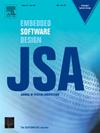MADDPG-based task offloading and resource pricing in edge collaboration environment
IF 3.7
2区 计算机科学
Q1 COMPUTER SCIENCE, HARDWARE & ARCHITECTURE
引用次数: 0
Abstract
With the rapid advancement of fifth-generation communication technologies, the data produced by the Internet of Everything is growing exponentially. As mobile cloud computing struggles to keep up with the demands for massive data processing and low latency, mobile edge computing (MEC) has emerged as a solution. By shifting services from centralized cloud platforms to edge servers located closer to data sources, MEC achieves reduced latency, enhanced computing efficiency, and an improved user experience. This paper introduces a task offloading algorithm designed for a multi-base station cooperative mobile edge environment, addressing the challenges of task offloading and resource pricing. The system architecture includes a macro base station and several micro base stations, strategically deployed in a densely populated mobile device area. Each mobile device serves as an autonomous decision-making unit, offloading tasks to an optimal base station. We model the interactions between base stations and end-users using a Stackelberg game approach, with strategy optimization achieved through a multi-agent deep deterministic policy gradient algorithm. The proposed TO-SG-MADDPG algorithm intelligently coordinates the policies of multiple base stations and end-users by centralized training and distributed execution, resulting in globally optimal task offloading and resource pricing. The results demonstrate that the proposed algorithm not only reduces the task loss rate but also safeguards the interests of all stakeholders.
边缘协作环境下基于maddpg的任务卸载与资源定价
随着第五代通信技术的飞速发展,万物互联产生的数据呈指数级增长。随着移动云计算努力满足海量数据处理和低延迟的需求,移动边缘计算(MEC)已经成为一种解决方案。通过将服务从集中式云平台转移到距离数据源更近的边缘服务器,MEC可以减少延迟,提高计算效率,并改善用户体验。针对多基站协同移动边缘环境,提出了一种任务卸载算法,解决了任务卸载和资源定价问题。该系统架构包括一个宏观基站和几个微型基站,战略性地部署在人口密集的移动设备区域。每个移动设备都充当一个自主决策单元,将任务分派给最优基站。我们使用Stackelberg博弈方法对基站和终端用户之间的交互进行建模,并通过多智能体深度确定性策略梯度算法实现策略优化。提出的TO-SG-MADDPG算法通过集中训练和分布式执行,智能协调多个基站和终端用户的策略,实现全局最优的任务卸载和资源定价。结果表明,该算法不仅降低了任务损失率,而且维护了所有利益相关者的利益。
本文章由计算机程序翻译,如有差异,请以英文原文为准。
求助全文
约1分钟内获得全文
求助全文
来源期刊

Journal of Systems Architecture
工程技术-计算机:硬件
CiteScore
8.70
自引率
15.60%
发文量
226
审稿时长
46 days
期刊介绍:
The Journal of Systems Architecture: Embedded Software Design (JSA) is a journal covering all design and architectural aspects related to embedded systems and software. It ranges from the microarchitecture level via the system software level up to the application-specific architecture level. Aspects such as real-time systems, operating systems, FPGA programming, programming languages, communications (limited to analysis and the software stack), mobile systems, parallel and distributed architectures as well as additional subjects in the computer and system architecture area will fall within the scope of this journal. Technology will not be a main focus, but its use and relevance to particular designs will be. Case studies are welcome but must contribute more than just a design for a particular piece of software.
Design automation of such systems including methodologies, techniques and tools for their design as well as novel designs of software components fall within the scope of this journal. Novel applications that use embedded systems are also central in this journal. While hardware is not a part of this journal hardware/software co-design methods that consider interplay between software and hardware components with and emphasis on software are also relevant here.
 求助内容:
求助内容: 应助结果提醒方式:
应助结果提醒方式:


